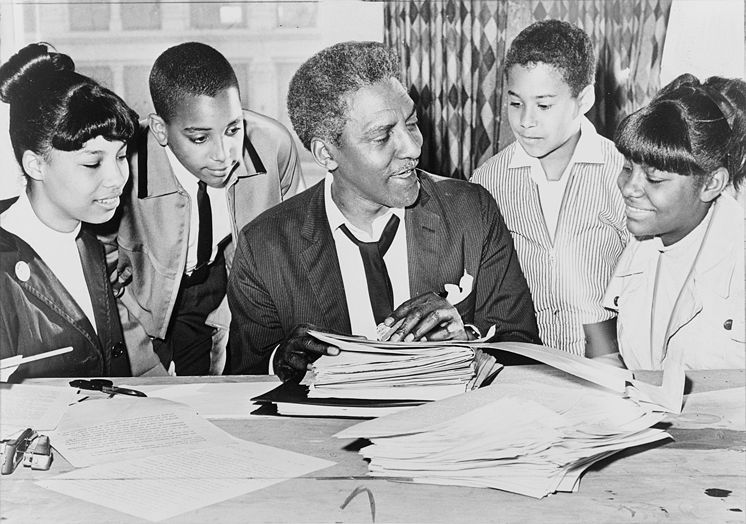Bayard Rustin: Remembering a Hero Of The Left
 Last Friday marked the twentieth anniversary of Bayard Rustin's death. An erstwhile pacifist who had spent two years in prison for resisting the draft during World War II, he was one of the most vital, albeit behind-the-scenes, figures in the civil rights movement. In 1942 he co-founded the Congress for Racial Equality, and in 1947 he led the "Freedom Rides to test the Supreme Court ruling banning segregation in interstate travel. He conceived the Southern Christian Leadership Conference with Martin Luther King Jr., which emerged in 1957 from the Montgomery bus boycott, of which he was a chief organizer. And in 1963 he helped organize the March on Washington for Jobs and Freedom. The non-violent tactics of the civil rights movement can largely be attributed to Rustin, who had traveled to India a decade before to learn from Mahatma Gandhi.
Last Friday marked the twentieth anniversary of Bayard Rustin's death. An erstwhile pacifist who had spent two years in prison for resisting the draft during World War II, he was one of the most vital, albeit behind-the-scenes, figures in the civil rights movement. In 1942 he co-founded the Congress for Racial Equality, and in 1947 he led the "Freedom Rides to test the Supreme Court ruling banning segregation in interstate travel. He conceived the Southern Christian Leadership Conference with Martin Luther King Jr., which emerged in 1957 from the Montgomery bus boycott, of which he was a chief organizer. And in 1963 he helped organize the March on Washington for Jobs and Freedom. The non-violent tactics of the civil rights movement can largely be attributed to Rustin, who had traveled to India a decade before to learn from Mahatma Gandhi.Despite these contributions, Rustin is little remembered by liberals today.
That's from an excellent essay in The New Republic by James Kirchick, whose brave critique of Robert Mugabe's tyranny I noticed here last month.
Kirchick has some more thoughts on Rustin and his contemporaries here, observing: "If they were alive today, I'd like to think that Bayard Rustin, Lane Kirkland and Al Shanker would be enthusiastic signatories of the Euston Manifesto. Perhaps the Democrats can look to these 20th century liberal giants for a start."





5 Comments:
At the risk of exposing my ignorance, why would an "erstwhile pacifist" be likely to subscribe to the Euston Manifesto?
Note that I don't consider this a critique of the Euston Manifesto, but rather of pacifism as a universal response (those Nazis weren't going to defeat themselves, so to speak).
Why? Everybody's allowed to make mistakes, and Rustin made many. He supported American aid to Afghan mujahadeen during the Soviet period and even looked kindly on Reagan's Granada adventure. As for pacifism,
he changed his mind, later on. In 1965, he resigned his posts with various pacifist outfits.
Fair enough. In this case, I've exposed my ignorance of the meaning of "erstwhile" :(.
Certainly, supporting the mujahadeen and the Grenada invasion are hardly the activities of a pacifist.
Gandhi was a pacifist but he was banking on the Japanese winning in WW2, until the Brits offered him a guarantee of freedom from colonial rule if he sided with the West against the Emperor. Some pacifist.
I've also come around to Tariq Ali's view that the terrors of the Partition can be laid at the feet of Gandhi (and other religious leaders) who divided a formerly friendly community of Muslims, Sikhs and Hindus on religious grounds. Just compare what Jinnah did in creating the (dreadful) Muslim state of Pakistan, and the much more successful state of India under Nehru, a secular leader, and a leader who conducted a successful war against Mao's Chinese invaders. I don't dislike all religious people and I don't know if it was best that Gandhi was killed by a religious nutcase, but I do know that I much prefer a clear separation of religion and state, thank you very much.
Good one, Kurt.
Jinnah was an abomination. Didn't know Ali thought that of Gandhi, though. Interesting. Certainly the British warrant less blame for partition than they're usually expected to shoulder.
Post a Comment
<< Home